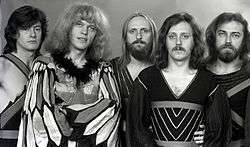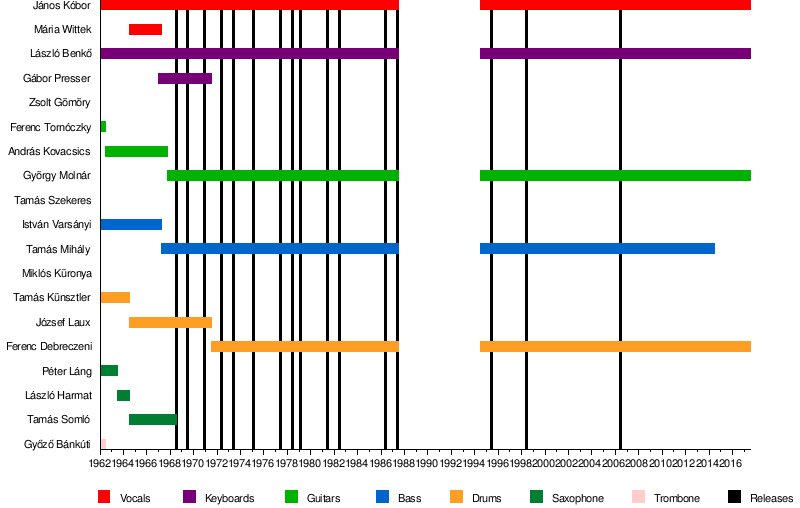Omega (band)
Omega is a Hungarian band formed in 1962, which has been described as the most successful Hungarian rock band in history.[1] They have released more than 20 albums in both Hungarian and English. After several early personnel changes, their classic lineup came together in 1971 and was intact for more than forty years. Singer János Kóbor and keyboardist/singer László Benkő have been in the band continuously since 1962; while guitarist György Molnár and drummer Ferenc Debreczeni joined in 1967 and 1971 respectively. They have won several prestigious awards for their contributions to Hungarian culture.
Omega | |
|---|---|
 The classic Omega lineup in 1974 (L-R: Ferenc Debreczeni, János Kóbor, László Benkő, Tamás Mihály, György Molnár) | |
| Background information | |
| Origin | Budapest, Hungary |
| Genres | Hard rock, psychedelic rock, progressive rock, space rock |
| Years active | 1962–1987, 1994–present |
| Labels | Qualiton, Pepita, Bacillus |
| Associated acts | Locomotiv GT |
| Website | www.omega.hu |
| Members |
|
| Past members |
|
History
Omega was formed in Budapest in 1962 by Benkő and Kóbor, with trombonist Győző Bánkúti, drummer Tamás Künsztler, saxophonist Péter Láng, guitarist Ferenc Tornóczky, and bassist István Varsányi. The members had all been in previous bands at the same grammar school.[2][3][4] Their first concert was at Budapest's University of Technology and Economics in September 1962.[5][6] The band went through many personnel changes in its first several years, and mostly played covers of British rock songs.[1]
Omega first began to write their own songs with the arrival in 1967 of keyboardist/singer Gábor Presser, who was adept in rock, jazz, and folk songwriting.[1] Guitarist György Molnár and bassist/singer Tamás Mihály also joined in 1967. The following year, the band was invited to tour England, where they recorded their debut album Omega: Red Star From Hungary with English lyrics for Decca Records.[7] Later that year, the album was re-recorded in Hungarian and released in the band's home country as Trombitás Frédi és a Rettenetes Emberek (Trumpeter Freddy and the Terrible People).[1][8] The band's sound during this period included experiments in psychedelic rock. Their 1969 song "Gyöngyhajú lány" ("The Girl With Pearls in Her Hair") was an international hit, and was later covered by the Scorpions.[1] During this period, members of Omega also gained notice for backing several Hungarian pop singers, most notably Sarolta Zalatnay.[9]
In 1971, Gábor Presser and drummer József Laux (who had joined in 1964) left Omega and formed the progressive rock band Locomotiv GT. (Tamás Somló, who had played saxophone for Omega from 1964 to 1968, became bassist for Locomotiv GT in 1973).[10] Presser was not replaced, while the band recruited new drummer Ferenc Debreczeni. The resulting lineup of Kóbor (vocals), Benkő (keyboards/vocals), Molnár (guitar), Mihály (bass/vocals), and Debreczeni (drums) remained intact for more than 40 years until Mihály retired from touring in 2014. Presser's jazz- and folk-oriented keyboards and songwriting had been dominant in Omega's sound; after his departure the band moved toward progressive rock and space rock with Benkő's classically-oriented keyboards and Molnár's heavy guitar as the focus.[1]
This incarnation of Omega released ten more albums starting in 1972 until taking an extended break in 1987. Most of those were released in both Hungarian and English versions. During the 1970s in particular, some of the band's albums were restricted or banned in Hungary due to the Communist regime's view that hard rock music was subversive.[11] However, they were able to tour in East Germany and recorded some songs in German for their fans in that country.[1] During this period they were also noted for science fiction-oriented lyrics.[12] After their thirteenth album Babylon in 1987, Omega went on hiatus so the members could focus on side projects.[1][13]
.jpg)
Omega regrouped in 1994 for a major concert at Népstadion in Budapest, with special appearances by former members Gábor Presser and Tamás Somló, plus Rudolf Schenker and Klaus Meine of the Scorpions.[14] Following the collapse of Communism in Hungary, most of Omega's previously suppressed albums were released on CD and generated great interest in the band as it returned to performing in 1994.[1] Their first new album after reuniting was Trans and Dance in 1995.[15]
In later years, the nation of Hungary bestowed many awards on the band for their important contributions to the country's music and culture, including the Hungarian National Award in 1998,[1] the Kossuth Prize in 2013,[16] and the Liszt Ferenc Prize in 1986.[17] For their 50th anniversary in 2012, Omega toured with a symphony under the name "Omega Rhapsody".[18] Longtime bassist Tamás Mihály, who had been with the band since 1967, retired from live performances in 2014, though his departure was not officially announced until 2017.[19] The band continues to tour regularly with a rotating cast of sidemen, and their most recent album 55 - Volt Egyszer Egy Vadkelet was released in 2017.[20]
Personnel
Members
|
|
Lineups
| 1962 | 1962–1963 | 1963–1964 | 1964–1967 |
|---|---|---|---|
|
|
|
|
| 1967 | 1967 | 1967–1968 | 1968–1971 |
|
|
|
|
| 1971–1987 | 1987–1994 | 1994–2014/2017 (?) | 2014/2017 (?)- |
|
Disbanded |
|
|
Timeline

Discography
Studio albums
- Hungarian language albums
- Trombitás Frédi és a rettenetes emberek (1968), due to marketing schemes the band's name was changed to Omega Red Star on the album cover
- 10 000 lépés (1969)
- Éjszakai országút (1970)
- 200 évvel az utolsó háború után (recorded in 1972, but not released until 1998 due to government censorship; Élő Omega, a fake "live" recording of the original studio material was released instead)
- Omega 5 (1973) later remixed, remastered and released as Szvit
- Omega 6: Nem tudom a neved (1975); later remixed, remastered and released as Tűzvihar - Stormy Fire
- Omega 7: Időrabló (1977);
- Omega 8: Csillagok útján (1978); later remixed, remastered and with its English-language version released as Csillagok útján - Skyrover
- Gammapolis (1979); later remixed, remastered and with its English-language version released as Gammapolisz - Gammapolis
- Omega X: Az arc (1981)
- Omega XI (1982)
- Omega 12: A föld árnyékos oldalán (1986)
- Omega XIII: Babylon (1987)
- Trans And Dance (1995); later remixed, remastered and released as Transcendent - Hungarian version
- Omega XV: Egy életre szól (1998)
- Omega XVI: Égi jel: Omega (2006)
- Omega Rhapsody (2010)
- 55 - Volt Egyszer Egy Vadkelet (2017)
- English language albums
- Omega Red Star From Hungary (1968) extremely rare vinyl recording, since October 2007 available on CD. Vocals by Mihály Tamás
- Omega (1973)
- 200 Years After The Last War (1974)
- Omega III (1974)
- The Hall Of Floaters In The Sky (1975)
- Time Robber (1976)
- Skyrover (1978)
- Gammapolis (1979)
- Working (1981)
- Transcendent (1996)
Also, one German studio album was released:
- Das Deutsche Album (1973)
Live albums
- Élő Omega (1972, released instead of their 4th studio album, first LP with Debreceni on drums; on official band's site is included on the Studio Albums list)
- Élő Omega Kisstadion 79 (1979; a 2-LP set)
- Live At The Kisstadion 79 (1979; a 2-LP set, including some tracks dubbed with English vocals)
- Kisstadion '80 (1981; 5 titles by Omega, and rest of the album by 2 other performers of joint show, Locomotiv GT and Beatrice)
- Jubileumi Koncert (1983)
- Népstadion 1994 Omegakoncert No. 1: Vizesblokk (1994)
- Népstadion 1994 Omegakoncert No. 2: Szárazblokk (1994)
- Az Omega összes koncertfelvétele 1. (1995, a 3-CD set of live recordings from the 1960s and 1970s, including the Kisstadion 1979 concert)
- Az Omega összes koncertfelvétele 2. (1995, a 3-CD set of live recordings from the 1980s and 1990s)
- Népstadion 1999 (1999, released as a 2-CD set and as a DVD)
- Napot hoztam, csillagot (2004 limited edition CD; a DVD of this title was also released, with a different track list)
- Greatest Performances (2012 edition on CD and DVD)
Compilation albums
- The Beaty Sixties (Trimedio Music, 2015)
- The Spacey Seventies (Trimedio Music, 2015)
- The Progressive Eighties (Trimedio Music, 2015)
- The Heavy Nineties (Trimedio Music, 2015)
- LP Anthology (Hungaroton, 2016, a 13 cd set of all the Hungarian language albums 1968-1987)
See also
| Wikimedia Commons has media related to Omega (band from Hungary). |
- Music of Hungary
- Hungarian rock
References
- "Omega | Biography & History". AllMusic. Retrieved 2020-07-28.
- "Cselszövésből lett az Omega". Archived from the original on 2012-12-06. Retrieved 2013-01-13.
- "Láng Péter interjú - 1. rész (2016)". Archived from the original on 2016-09-27. Retrieved 2016-09-25.
- "Bánkúti Győző - interjú (2016)". Archived from the original on 2016-12-20. Retrieved 2016-12-18.
- "Beszélgetés egy igazi legendával -Interjú Kóbor Jánossal, az Omega énekesével". lelleikulturpark.hu. Retrieved 2020-05-21.
- "Tornóczky Ferenc - interjú (2017)". Archived from the original on 2017-03-02. Retrieved 2017-03-01.
- "OMEGA - Omega Red Star: From Hungary (1968)". Progarchives.com. Retrieved 2020-07-28.
- "OMEGA : Trombitás Frédi És A Rettenetes Emberek - CD - HUNGAROTON - Forced Exposure". www.forcedexposure.com. Retrieved 2020-07-28.
- Batey, Angus (2015-10-13). "Cult heroes: Sarolta Zalatnay, the Hungarian Janis Joplin who was key to rock's evolution". The Guardian. ISSN 0261-3077. Retrieved 2020-07-24.
- "Locomotiv GT - europopmusic". www.europopmusic.eu. Retrieved 2020-07-24.
- "Omega's Staying Power : Rock Group Keeps Beat in Hungary". Los Angeles Times. 1987-09-05. Retrieved 2020-07-28.
- "Omega - europopmusic". www.europopmusic.eu. Retrieved 2020-07-28.
- "OMEGA Babylon [Ω XIII] reviews". Progarchives.com. Retrieved 2020-07-28.
- "Az Omega is szerepel a Scorpions koncertjén!". Fémforgács (in Hungarian). 2009-02-27. Retrieved 2020-07-28.
- "Omega: Trans and Dance". Zene.hu (in Hungarian). Retrieved 2020-07-28.
- "Archivált másolat". Archived from the original on 2013-03-18. Retrieved 2013-03-15.
- "Archivált másolat". Archived from the original on 2015-02-04. Retrieved 2013-03-27.
- "OMEGA - Omega Rhapsody (2010)". Progarchives.com. Retrieved 2020-07-28.
- "Királyi hét Nagyváradon az Omegával". kronikaonline.ro (in Hungarian). Retrieved 2020-07-28.
- "OMEGA - Omega 55: Volt Egyszer Egy Vadkelet (2017)". Progarchives.com. Retrieved 2020-07-28.